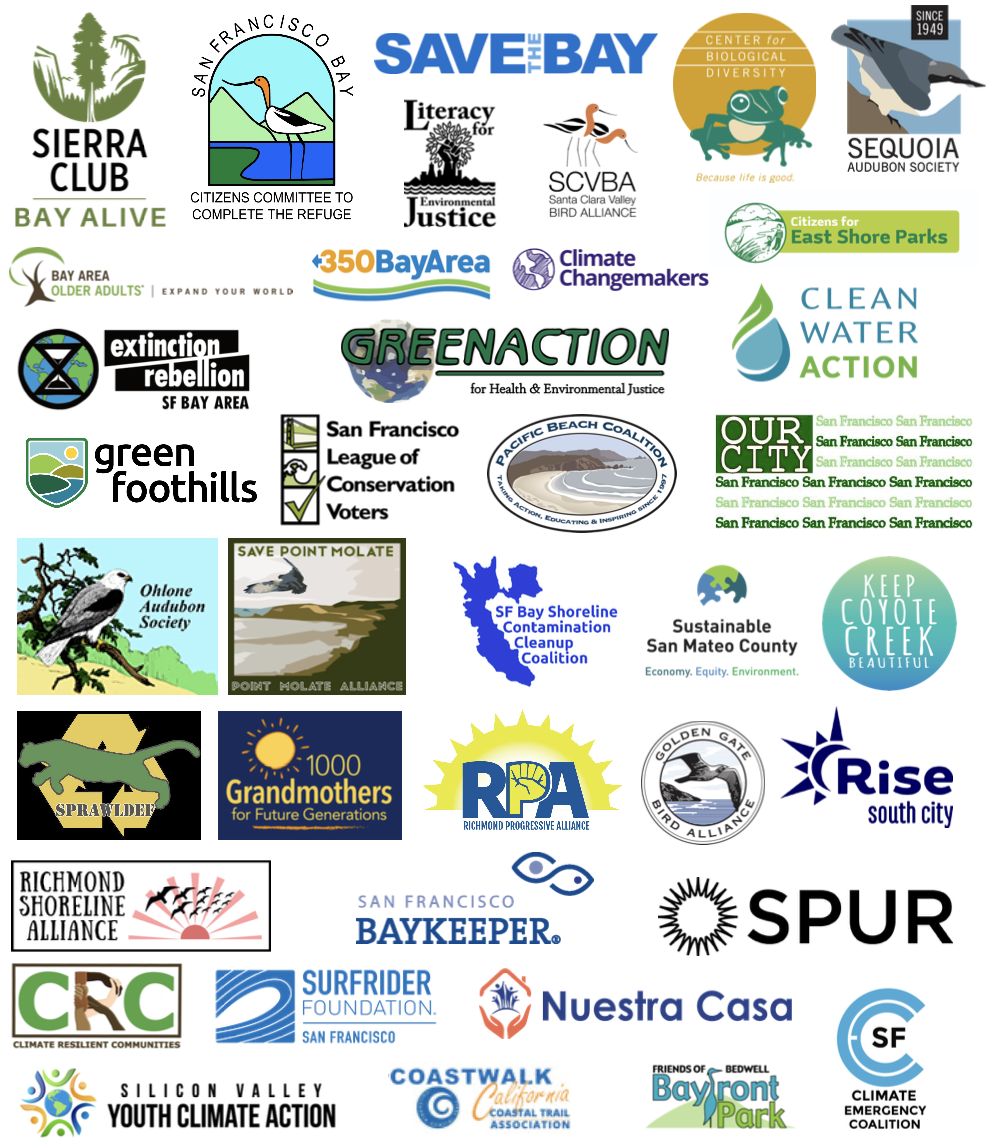
November 13, 2024
The Regional Shoreline Adaptation Plan (RSAP) presents an unprecedented opportunity to safeguard a thriving and resilient future for the San Francisco Bay and its surrounding communities so that our economy and communities can thrive. The undersigned organizations are united in our belief that a strong, regionally coordinated approach to sea level rise adaptation must affirmatively prioritize equity, natural and nature-based solutions (NNBS), and safety from contamination threats.
BCDC’s Draft RSAP Shows Strong Regional Leadership
We applaud BCDC’s efforts to ensure a holistic, strategic, and forward-looking regional response to sea level rise that protects both vulnerable communities and a broad spectrum of public “assets,” including the societal and economic benefits provided by our Bay habitats. The RSAP charts a course toward safe and sustainable development and infrastructure. The RSAP’s One Bay Vision brings the whole region together to promote collaboration, protect shared assets and achieve common goals. The RSAP’s minimum criteria and standards set key parameters and define a framework of priorities that must be addressed, while leaving substantial flexibility for localities to design strategies tailored to specific local needs, resources and opportunities, consistent with the framework.
Concern About Calls To Weaken the RSAP
We are deeply concerned about recent calls to weaken the RSAP’s required Adaptation Strategy Standards (Standards) in order to allow greater flexibility, and even create new incentives, to enable more shoreline development. This would undermine efforts to preserve and expand natural and nature-based solutions for resilience to long term sea level rise. Shoreline ecosystems—wetlands, tidal marshes, and other vital habitats—are irreplaceable, offering unique and critical benefits to local communities that cannot be relocated, unlike housing and other development, which can be sited away from vulnerable shorelines. Bay ecosystems have specific ecological needs that only the Bay can provide.
The RSAP’s required Standards are essential to ensure that all local jurisdictions contribute to a unified, coordinated, and effective approach to sea level rise adaptation. Weakening these Standards to favor development in these fragile and essential areas would enable localities to pursue unsustainable land use practices that subsequently put more people and resources at risk of sea level rise impacts.
Downgrading the RSAP’s Adaptation Strategy Standards from requirements to mere recommendations (shifting from “must” to “should”), would represent a significant step backward, sending the wrong message: that development interests can override the urgent need for regional climate adaptation. This would allow individual localities to adopt shoreline development and sea level rise adaptation strategies that fragment the region’s response, undermine the intent of the Standards, increase long-term costs, and lack accountability to regional long range goals. The RSAP would become just another toothless source of “advice,” defeating the purpose of regional coordination.
Why Regional Coordination is Key
Regional coordination is essential to ensure that the entire Bay Area plans for sea level rise in a way that is equitable, comprehensive, and effective. A coordinated regional approach supports localized adaptation strategies while avoiding negative cross jurisdictional impacts, such as deflecting wave energy and associated flooding to other communities. It establishes a common framework to safeguard vital public assets and infrastructure—such as Baylands ecosystems and their natural resilience functions, transportation networks, and emergency services—upon which the entire region depends.
Importantly, it also ensures that the needs of historically marginalized and frontline communities are prioritized, preventing adaptation solutions from entrenching existing inequities. By defining a consistent set of regional priorities, setting minimum criteria and standards, and elevating community voices, the RSAP helps level the playing field and reduces the potential outsize influence of special interests and the traditional inclination toward short-term planning.
A Call to Strengthen, Not Water Down, the RSAP
We, the undersigned organizations, are united in our strong opposition to weakening the RSAP’s Standards and in our vigorous support for centering equity and natural and nature-based solutions throughout the RSAP . We urge you to strengthen the RSAP by placing a greater emphasis on NNBS, defining regional habitat goals or metrics, and addressing key gaps in the Adaptation Strategy Standards, particularly related to contamination risks from toxic sites along the Bay shoreline. Additionally, we urge you to provide additional guidance over competing land use demands by prioritizing public trust rights and resources over privatized benefits.
We ask BCDC to uphold its leadership in this effort by maintaining the integrity of the RSAP , resisting efforts to weaken its Standards, and addressing the remaining gaps described above and detailed at greater length in previous letters during the public comment period. Strong regional Standards ensure that environmental protection, public safety, and equitable outcomes remain central to all shoreline planning efforts. Please continue to champion a bold vision for a resilient Bay Area and an RSAP that secures a safe and sustainable future for the Bay and all our communities for generations to come.
Sincerely,
|
Arthur Feinstein Carin High Kat Broomall Dr. Anne Ferguson Lisa Belenky Shirley Dean Jennifer Clary Eliza Nemser Cade Cannedy Una JM Glass Leah Redwood Chris MacIntosh Janet S. Johnson Julio Garcia Aundi Mevoli Skylar Sacoolas Kristina Pappas Shani Kleinhaus |
David Lewis Laura Neish Alice Kaufman Glenn Phillips Skylar Sacoolas Deb Kramer Dr. Hollis Pierce-Jenkins Miriam Yupanqui William Hoppes Eric Brooks Lynn Adams Pam Stello Richmond Progressive Alliance Leslie Flint Ze-Kun Li Norman La Force Sarah Atkinson Nina Atkind Sarah Hubbard |